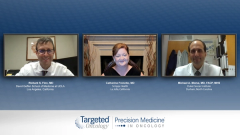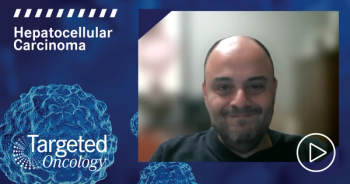
Exciting Targets Under Study in HCC
Episodes in this series

Richard S. Finn, MD: Looking deeper into the pipeline, Michael, looking into your crystal ball, are there targets or mechanisms that are waiting to be exposed in the liver cancer space that you’re interested in?
Michael A. Morse, MD, FACP, MHS: We talked earlier about the molecular makeup of these tumors and how there are some targetable and actionable mutations. We have to find them. We have to test for them. The activity of drugs against some of those targets will be found in basket trials. We can’t forget that there are some patients for whom we do have drugs that could be beneficial. It’s a small number, but they’re there.
The second area you pointed out is FGFR4, which is very different from FGFR1, FGFR2, and FGFR3. You alluded to the fact that there can be amplifications of portions of chromosome 1, I believe, where FGF19 sits.
Richard S. Finn, MD: Chromosome 11.
Michael A. Morse, MD, FACP, MHS: Chromosome 11, I’m sorry. Thank you. There’s a small percentage of those patients, and perhaps targeting FGFR4 will have activity. A higher number of hepatocellular carcinoma patients have elevated levels of FGF19 expression but don’t happen to have the amplification. So that’s kind of an example of some of those needles in the haystack that we haven’t really addressed.
Of course, I have to say, immunotherapy continues to be an area where there should be more expansion. There are T-cell products that are being looked at in hepatocellular carcinoma because they are in many other solid tumors. There are also bispecifics being tested in this disease.
Richard S. Finn, MD: Also, cell-based therapies, right? There are technologies with mechanisms that target specific proteins in liver cancer. Adaptimmune Therapeutics plc is developing a cell-based therapy against AFP-expressing tumors, right? That obviously has a lot of promise. As we’ve seen in other tumor types, harnessing the immune system with specificity can lead to improved outcomes for patients. And also, whatever works in other cancers for overcoming resistance to immune checkpoint inhibitors will probably have an impact in liver cancer.
But when I look at lung cancer and melanoma, everybody is talking about targets. None of them has panned out. There’s a lot of hope, looking at LAG3, TIGIT, and other immune checkpoint markers. When we see some activity in other cancers, we’ll probably apply that to liver cancer as well.
What an exciting program. It was brief, but we covered a lot of material. It’s been very informative.
I’d like to thank you, Dr Frenette, or Catherine, and Dr Morse, Michael, for this very insightful discussion. I’d like to thank our audience for joining us, and I hope they found it useful. Thank you to our host, Targeted Oncology™, for hosting this presentation on precision and molecular medicine in liver cancer. Thank you very much for joining us.
Transcript edited for clarity.





















